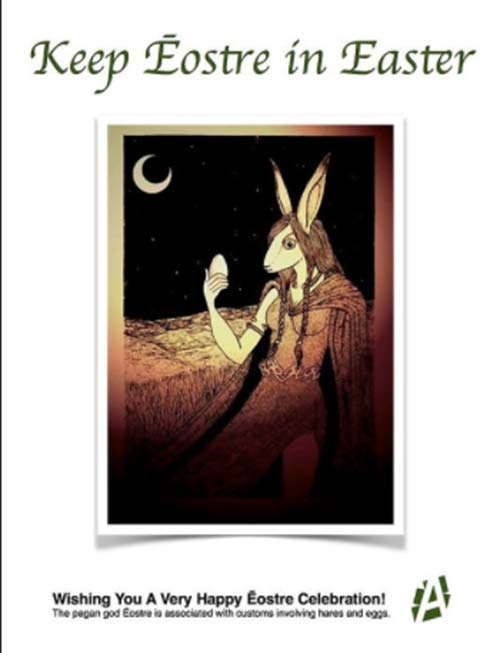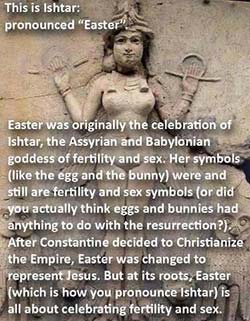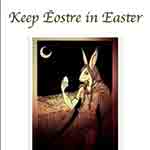
This year there were the usual suspects attacking me online, often anonymously, from the Bible-alone crowd, that Good Friday isn’t in the Bible, that I am living in darkness, that I am ignorant, that I was following “man-made” (sic) rules, and that Easter is a pagan celebration.
Anita Lea (who has 95K followers on twitter – so significantly influential) led the way, saying that by celebrating Good Friday and Easter I was living in (and promoting) darkness, and that I should do some research.
 It turned out that for my “research”, she sent me the image on the left, which, of course, is absolute nonsense – misinformation from The Richard Dawkins Foundation for Reason and Science (Official) [sic] facebook page. And I debunked this nonsense here.
It turned out that for my “research”, she sent me the image on the left, which, of course, is absolute nonsense – misinformation from The Richard Dawkins Foundation for Reason and Science (Official) [sic] facebook page. And I debunked this nonsense here.
I replied to Anita with the link explaining that she was promoting Dawkins-style misinformation. From someone else, I received commendation for “debunking Darwinism” (which I wasn’t and don’t). And then I saw that all those tweets were removed (and as is often the case in such “discussion” – I was “blocked” – this means you cannot view tweets if you are logged into your twitter account.)
Now I come to the headline of this post. In the discussions, another person tweeted me the image at the top of this post, an image, I discovered, that is very popular online.
And here’s the point: those of you who know how Easter (and Eostre) is worked out, will know that the phase of the Moon in the image is wrong. It should be Full Moon!
ps. The misinformation continues, that we Christians, when we celebrate Easter are “partaking in rituals with illuminati“, We are told, “Easter is 100% concentrated paganism.” We should “learn the filthy origins of the Easter egg, the Easter bunny, and the Easter Sunrise Mass. Who is this ancient goddess named Easter? Why is Christianity observing an ancient Babylonian child sacrifice rehearsal in celebration of the resurrection of Jesus?” “we know the pagan origin of the ancient Babylonian Sex goddess Easter” And that this is information “your pastor doesn’t want you to know“.
pps. I have no issue if/when Christianity incorporates practices and ideas from “paganism”, Science, local ideas, culture, traditions, practices, etc.
I hope, if you appreciated this post today, that you share it (facebook and so on). And do remember to like the liturgy facebook page, use the RSS feed, and sign up for a not-very-often email, …




A colleague of mine recently shared with me a line of the Jesuit theologian Bernard Lonergan, who said it was important to try to inhabit the “not-so numerous centre,” in the sense of the middle ground between progressives and conservatives.
I feel like your blog inhabits a not-so-numerous centre of a different kind, Bosco. An island of sanity hemmed in on every side by a whole lot of crazy. (I readily admit that I myself probably spend too much time cooling my toes in the surf of lunatic fanaticism.)
Nice to be reading you again. It was a long Lent!
What a lovely compliment, Jesse! I feel like printing it as a poster to cheer me through some of the crazy. And might even quote it from time to time 🙂 Christ is Risen!
Glad to offer some well deserved encouragement, Bosco.
I managed to track down the full Lonergan quotation (which I seem to have misremembered by a word). He was writing particularly with a view of the “transposition” that was taking place in culture at large, and particularly within the Church through Vatican II. He welcomed the council, but worried that enthusiasts were too quickly embracing a lot of bad philosophy:
“Classical culture cannot be jettisoned without being replaced; and what replaces it cannot but run counter to classical expectations. There is bound to be formed a solid right that is determined to live in a world that no longer exists. There is bound to be formed a scattered left, captivated by now this, now that new development, exploring now this, now that new possibility. But what will count is a perhaps not numerous center, big enough to be at home in both the old and the new, painstaking enough to work out one by one the transitions to be made, strong enough to refuse half-measures and insist on complete solutions even though it has to wait.”
[Bernard Lonergan, SJ (1904–1984), an article entitled “Dimensions of Meaning,” in his first book of collected essays, *Collection* (1967); now repr. in Collected Works 4 (Toronto: University of Toronto Press, 1988), pp. 244-5.]
This is a good voice for me to heed, especially as I find myself more and more attracted by the stance of the “authentic reactionary” (as outlined by the Colombian intellectual Nicolás Gómez Dávila), who becomes more or less resigned to cultural collapse and amnesia!
But the two are not, I think, fundamentally contradictory. Just as Lonergan says that one should avoid a “solid right” yearning for a world that “no longer exists,” so Gómez Dávila says that “The pure reactionary is not a dreamer of abolished pasts, but a hunter of sacred shades on the eternal hills.”
Each one assumes—or rather puts his faith in—the existence of an eternal, unchanging centre, which can provide a sound orientation for the ever shifting relations of human culture. It becomes a question of how well a culture (and indeed the Church) apprehends the truth, and that apprehension is necessarily active rather than passive.
Yesterday being the feast of St Mark, I meditated for a while on the BCP epistle for the day, and I was very struck by the teaching that all the varied gifts of the Spirit are given that we may cooperate in finally arriving at perfection (maturity) “in the unity of the faith, of the knowledge of the Son of God” (Eph. 4:13).
That’s the goal: convergence on full knowledge of Christ—which I take to mean not just knowing him, but knowing as he knows.
Thanks, as always, Jesse. Blessings.
It seems to me that there are two issues arising:
1) “what does the Church offer society?” – a continual low-grade background thought, a kind of axis on which the church is occasionally challenged (from “science”, from opposition, from bashers). Something to be aware of, to keep in mind, perhaps.
2) What gives with those who suffer from a hard-line mentality that somehow Christianity must be different, an island unto itself? (The antithesis of your “incorporation” line, which is realistically how religions evolve anyway – compare and contrast “how many days is Christmas?” versus how the duration of Saturnalia expanded.) Maybe there is a clear split in people’s psyche, that some would rather adopt the island mentality which lends itself to bible-only and other forms of elitism.
Thanks, Tim. If I understand what you are saying aright – you are reinforcing that Christianity claims to worship the creator of all, and celebrates the incarnation of/union between that Creator and creation. Easter Season Blessings.
Very intersting and enjoyable. Thank you.
May I add an intersting tid-bit ?
that in North Wales the verb eistedd (to sit) is, in fact, pronounced “easter” !
Jon Birch (on Facebook at ASBO Jesus and with a website at which once the cartoons were hosted) did a cartoon “The Easter Bunny lays a chocolate egg and out pops the baby Jesus” to illustrate seasonal confusion. Many other interesting ideas and cartoons too.
Thanks, Mark. Found it. Easter Season Blessings.